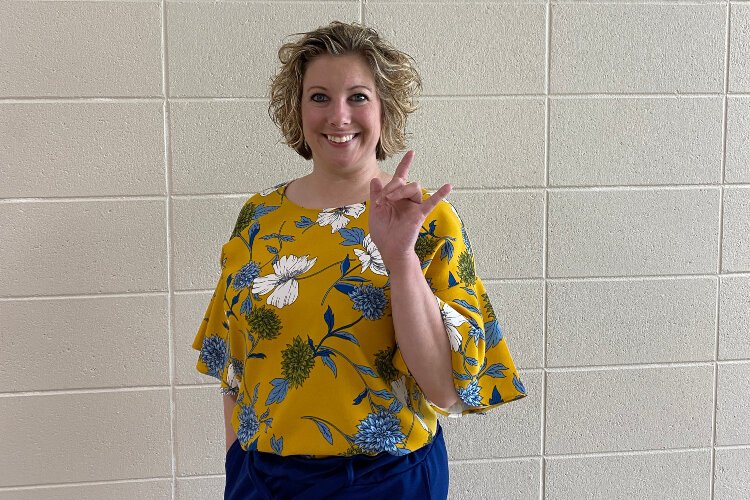By Evan Arnold, Voices of Youth contributor
Editor’s note: This article by Northview High senior Evan Arnold first appeared in Rapid Growth Media as part of the Voices of Youth series. Voices of Youth is a paid journalism opportunity that aims to lift youth voices focused on community issues and solutions. Kent ISD is a Voices of Youth sponsor. School News Network accepts student submissions from a variety of sources.
This year’s Super Bowl XLVII halftime performance heavily spotlighted both famed singer, Rihanna, and Deaf American Sign Language Interpreter, Justina Miles. During the 13-minute performance, however, viewers had to access an alternate source to watch Justina Miles’ interpretation. Miles still captivated audiences, as snip-its and videos of her expressive signing blew up on platforms such as TikTok and Instagram, quickly leading to national popularity. In addition to Miles’ performance, this year’s Super Bowl XLVII also showcased esteemed Deaf actor and Oscar winner Troy Kutsor, who interpreted the national anthem.
These performances quickly led to shared concern expressed between both the Deaf and hearing communities.
Why is it necessary to find an alternate source in order to provide equal access during a performance that is intended for everyone? And further, how can our Grand Rapids community work to continue bridging communication gaps during performances?
Not the same experience
According to the Detroit News, around 633,000 residents in Michigan are hard of hearing, with about 46,000 residents identifying as Deaf. These numbers not only illustrate simply how large the community is, but reiterate the immense population within our own community that may potentially need to receive access to interpreters.
Northview High School Sophomore Gisel Gallarzo is a member of the Deaf community and says for those who need an interpreter at events, it is their personal responsibility to find their interpreter through an outside organization. Once they have filed a request for an interpreter and it has been approved, the interpreter’s appearance is arranged by the corresponding organization. Finally, after going through the process of setting up an interpreter, those requesting that accessibility then have to rely on the responsibility of the interpreter to arrive on time.
The process of receiving access to interpreters can be strenuous in all settings, but fortunately, organizations such as Deaf and Hard of Hearing Services (DHHS) helps with this process within our community. Even with the organization’s assistance, there is still a lack of interpreter coverage within the performing arts right in Grand Rapids.
When discussing interpreter coverage during these performances, Gallarzo describes how “it just doesn’t offer the same communication and experience without an interpreter present.”
Overall, she highlights the importance of interpreters within the performing arts because in the end, “I don’t want us to be alone or separate, I want us to work together.”
Marie DeRegnaucourt is an American Sign Language teacher at Northview High School and says while she has seen interpreters at concerts and sporting events, interpreter coverage at other performing events can be somewhat limited.
“Flashback to Super Bowl XXVII,” DeRegaucourt says. “Actress Marlee Matlin interpreted alongside singer Garth Brooks during the national anthem. Matlin shared the stage with Brooks during their performance; since then it has not been replicated — why?”
In order to personally combat this, DeRegnaucourt has worked alongside Northview High School’s theater department to create an immersive experience for those who are Deaf or hard of hearing during a final dress rehearsal of the musical Matilda this past March.
“This is definitely an experience I would do again because everyone took away so much from it,” she says.
Unfortunately, interpreter shortages nationwide have added a challenge to increasing accessibility. In 2021, there were 69,400 interpreter total positions — which reflects the number of filled and vacant openings. To gain some perspective on the shortages, however, the Registry of Interpreters for the Deaf only lists around 10,000 total American Sign Language interpreters in the United States.
DeRegnaucourt says she would “like to have more interpreters at these events, but there’s constantly a hard time finding coverage so the interpreters that are available are working double time.”
One Grand Rapids organization is increasing accessibility
Regardless of the challenges presented within our community, there are some organizations working to provide equal access — one of which is the Grand Rapids Civic Theatre.
For its 97th season, the Grand Rapids Civic Theatre provides interpreted showings of its performances on the second Saturday of every show. The purpose is to make theater more accessible to everyone.
Jessica Burke, director of audience experience at the Grand Rapids Civic Theater, explains the biggest approach to accessibility is to analyze the theater’s current programming based on how it is serving the community.
“[We then] search for how we could better serve them,” Burke says.
A big part of the Grand Rapids Civic’s accessibility work focuses on offering solutions before people need to ask and providing an experience that is enthralling and inclusive for everyone.
For what’s next, Burke hopes to see “more individuals in on a volunteer basis that are able to sign … so we are able to provide a more cohesive experience.”
Overall, the Grand Rapids Civic Theater is primarily focused on making this the most enjoyable experience possible for everyone; which has received lots of support since the beginning of these performances.
Their work for accessibility, however, is far from over, with Burke addressing the desire to “continue to create a welcoming environment for everyone.”
Learn more about Rapid Growth’s Voices of Youth project and read other installments in the series. This series is made possible via underwriting sponsorships from the Steelcase Foundation, Frey Foundation, and Kent ISD.
Northview High School Senior Evan Arnold currently studies American Sign Language and plans to study American Sign Language Interpretation at the Rochester Institute of Technology (RIT) in upstate New York after graduation this May.














